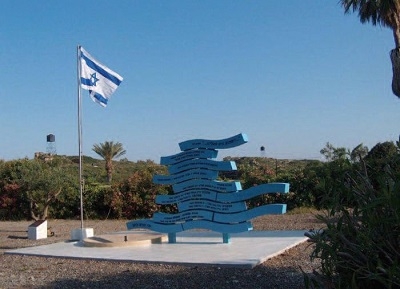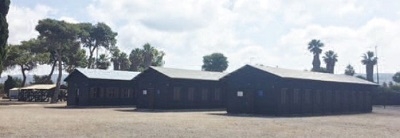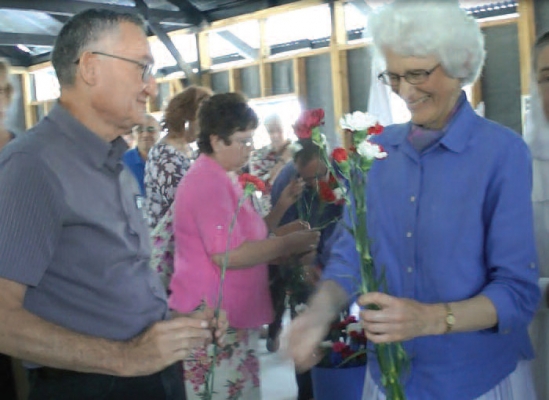Apologising for What the Brits Did
Perhaps you, my readers, will question these words but hope always remains in the hearts of the majority of us Israelis. So, what leads me to write about this matter—an invitation to a small, but unforgettable collection of wooden buildings near the shores of Atlit. They are the remains of the Detention Camp set up under the British Mandate in the 1930s where Jewish refugees were detained as they struggled to disembark from their vessels of escape onto the shores of their 'promised' land—then Palestine. The British bowed their heads to Arab demands to limit the number of immigrants and closed many doors to the Jewish refugees. The majority were escapees from rising anti-Semitism in Nazi occupied Europe in the late 1930's and early 1940's and then post-1945 survivors of the Holocaust. The conditions in the Detention Camp were reminiscent of the Nazi Concentration Camps— surrounded by barbed wire and watch towers, the separated men and women were sprayed with DDT, undressed and scrubbed down, then interned in small wooden huts with minimal facilities.
The entire situation during those years of the Mandate was a deep and hurtful misconception that led to shameful behavior on the part of the British. Under the Balfour Declaration, Britain "view with favour the establishment in Palestine of a national home for the Jewish people." Besides the imprisonment in Atlit, the British also sent refugees who surpassed the monthly quota to camps that were set up in Cyprus. This is the background to a heartfelt happening that I was invited to attend at the Atlit Camp on May 11—a ceremony to mark the 70th anniversary of the end of the British Mandate. For people like myself, who have visited the camp as part of a tour in the past and just read the basic history, this was an eye/ and heart-opening ceremony that brought the calamities, the frustrations, and the suffering of so many, back to life.
The event was organized by 'Love Never Fails' which was set up by several British Christian organizations in the late 1990s to demonstrate their sorrow and repentance for British anti-Semitism through the ages and to give love and support. They now have some 20,000 members with projects both in Israel and in Britain. The ceremony was organized by Rosie Ross who represents the organization in Israel. On a flight home to Israel from a meeting in the U.K. she made a decision to call the association she would set up here 'Repairing the Breach' and that was what she devoted herself to do.
So, there we were, sharing the day of commemoration—a large group of visitors from all over the U.K. together with Israelis who had suffered under the Mandate and their families plus other guests, many of whom had a story to tell.
After a taste of getting to know one another around welcoming refreshment tables, we were seated in the newly renovated museum—the kitchens of the past—waiting for the ceremony to start. Rosie Ross welcomed us all. Throughout the morning we were moved and fascinated by personal stories from the past, with all the set-backs and the suffering. The behavior of the British during the years of the Mandate was gradually and dramatically presented to us. We heard how some 250,000 Jews from Poland were secretly organized and in an effort to save them were sent to Czechoslovakia in preparation for escape from Europe. A strictly worded request came from the British "Survivors back to their countries, not to Palestine"! Then came the individual accounts.
There was Pinchas whose mother as a young girl had been imprisoned in Auschwitz and whose father was hidden by priests in a monastery in Romania. His parents met after the end of the war—both rescued by the Irgun HaBericha and put into the same camp in Romania where they fell in love, were married and put on board one of the ships to Haifa. There they were stopped and sent to the camps on Cyprus, where Pinchas was born; the Cypriots showed them great kindness, but never the Brits. In February 1949, they were freed and brought to Israel. He refuses to speak English; his mother, now 95, is still alive and lives in Netanya. He pleaded with the British in the audience that happenings such as this be taught in the schools in Great Britain.
Hannah from Warsaw was introduced; she too had been hidden and educated in a monastery during her childhood and was later assisted to come to Israel on the Exodus. She had just finished telling her story when a gentleman in the audience, who had continuously raised his hand, stood up and divulged his story. He had also been on board the Exodus and was badly injured by the British when they attacked and boarded the ship. He was taken off the ship and initially cared for in a hospital in Haifa and then transferred to the Atlit Camp by the authorities and was there for six months. He had been just 14-years-old and was left alone.
Next came Hebron—the year 1929, with the fighting that flared up between the Arabs and the Jews—memories from people who had been there, were retold to the audience. The Mufti of Jerusalem stirred up the feelings of hatred that were growing between Arabs and Jews by claiming "El Aksa is in danger"! And Hebron turned into a place of terror and murder, ending with the death of 67 Jews who had been completely helpless; homes and synagogues were destroyed and the survivors were relocated to Jerusalem. No interference or assistance from the British Mandate to save the massacre of the Jews. Apparently, there was an eventual apology.
Then, the memory of another terrible tragedy was told by Zahava whose parents arrived in Israel in 1934 and settled in Jerusalem, close to the British Authorities Office. As a child aged 12. she and her brother had witnessed the tragic Arab attack on the convoy bringing medical and military aid to the Hadassah Hospital that had been transferred to Mount Scopus. 78 Jewish doctors, nurses, students, patients, and Haganah fighters were killed. There was no proper prevention of the event by the British Forces and no intervention until almost the last minutes of calamity.
We listened to apologies from the hearts of our British visitors and supporters which included a 'Declaration of Sorrow'. They had come specifically to ask forgiveness for the behavior of Britain during all the years of the Mandate and expressed their belief that Israel had been, was and would continue to be the Land of the Jewish People. This was shown in a documentary that was produced by Hugh Kitson, who also told us about his work and beliefs.
A colorful flower was presented to each of the Israelis in the audience as we left the lecture area to view, read and take home booklets of information about their work and their beliefs. There was also a gift of a video, showing the first 45 minutes of the film by Hugh 'Whose Land,' which we all viewed together after our picnic lunch that was laid out beside the reception area. There, we had more time to expand friendships and feel the moral support of the visitors.
It was a touching and memorable occasion in these troublesome days of anti-Semitism that is increasing across Europe and the lack of supportive coverage by the majority of international media for the dilemma brought about by hostility from the Hamas rulers of Gaza, with which Israel has to deal. If only more people in the world would open their eyes and minds as these special supporters have done!
Footnote: Additional information about Hugh Kitson's films can be viewed on Google.










Comments